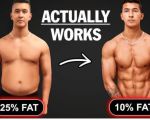Expert Interviews with Fitness Professionals: Unlocking the Secrets to Better Health
As someone who’s been on a fitness journey for years, I’ve learned that there’s always something new to discover when it comes to fitness, health, and wellness. That’s why I decided to reach out to a few experts in the field to gain some valuable insights. By interviewing fitness professionals, I wanted to uncover their secrets, tips, and advice to help you (and me) get the most out of our workouts and overall well-being.
1. Understanding the Importance of Consistency in Fitness
One of the most common pieces of advice I’ve received from fitness professionals is the importance of consistency. According to Sarah, a certified personal trainer and fitness coach I recently spoke with, the key to long-term success in fitness isn’t about how intense your workouts are, but how consistently you show up. "Whether you’re aiming for weight loss, muscle gain, or general health, consistency is the foundation," she said.
Sarah shared her own story about how, early in her career, she would push herself to the limit every time she worked out, but often found herself burnt out and discouraged. "When I switched to a more balanced, consistent approach, where I focused on smaller, more manageable goals, that’s when I really started seeing progress," she explained. Her advice was simple yet powerful: set realistic goals, focus on consistency, and gradually build up the intensity over time.
2. The Role of Nutrition in Achieving Fitness Goals
Fitness experts often talk about the importance of pairing exercise with a balanced diet, but what does that look like in practice? To dig deeper, I spoke to Jason, a registered dietitian and nutritionist, who works with professional athletes and fitness enthusiasts. Jason emphasized that fitness isn’t just about what you do in the gym—it’s about what you put in your body, too.
Jason explained, "Nutrition fuels your body, supports recovery, and helps you achieve your fitness goals. Without proper nutrition, even the best workout plan can only take you so far." He gave me a detailed breakdown of macronutrients—proteins, fats, and carbohydrates—and how they each play a vital role in performance and recovery. "For instance, if you’re aiming to build muscle, you need to ensure you’re getting enough protein to repair muscle fibers after a workout," Jason added. It’s not just about cutting calories; it’s about fueling your body to perform at its best.
3. Finding the Right Workout for Your Body Type
Fitness isn’t a one-size-fits-all approach, and I’ve learned that the workout routine that works for one person might not work for another. To shed some light on this, I interviewed Matt, a fitness coach specializing in body mechanics and individual performance. Matt spoke about the importance of customizing your workouts to fit your body type and fitness goals.
"Understanding your body type—whether you're an ectomorph, mesomorph, or endomorph—can greatly influence the way you train," Matt explained. He went on to discuss how different body types respond to different types of exercise. For example, ectomorphs (typically leaner individuals) might benefit from more strength training to build muscle, while endomorphs (individuals with a higher body fat percentage) might focus more on cardiovascular exercises to improve endurance and burn fat.
Matt also recommended consulting with a fitness professional who can design a personalized plan based on your unique needs. "It’s important to recognize that no two people are the same, and your workout plan should reflect that," he said. This advice has changed the way I approach my own training, focusing more on what works for my body and less on trying to follow trends.
4. Overcoming Mental Barriers to Fitness
One of the challenges I’ve personally faced—and I know many others do as well—is overcoming mental barriers to fitness. Sometimes, getting started is the hardest part, or maintaining motivation during a long journey can be difficult. I reached out to Amy, a sports psychologist, to discuss how mental health affects physical fitness.
Amy emphasized the connection between mental and physical health, stating, "Fitness is as much about mental strength as it is about physical strength. If you’re not mentally committed or motivated, it’s hard to stay consistent." She shared a few strategies that have helped many of her clients, including setting small, achievable goals, tracking progress, and using positive reinforcement. "Breaking down your goals into small, manageable chunks makes it less overwhelming and helps you stay focused," she said.
For me, this advice has been transformative. Instead of focusing on the big picture (which can be intimidating), I’ve started setting smaller milestones. Celebrating these small wins has made my fitness journey feel less stressful and more rewarding.
5. The Importance of Recovery in Fitness
Fitness professionals often talk about the importance of pushing your limits, but equally important is knowing when to rest and recover. I spoke to Lindsay, a yoga instructor and certified fitness trainer, about the importance of recovery in maintaining long-term fitness. "Too many people overlook recovery," Lindsay explained. "Recovery isn’t just about taking a day off; it’s about giving your muscles and body time to heal so you can come back stronger."
Lindsay advised incorporating recovery days into your weekly routine, as well as focusing on mobility exercises like yoga or stretching to improve flexibility and prevent injury. "Active recovery, like a gentle yoga session or walking, helps stimulate blood flow and reduce soreness," she said. This advice has helped me rethink my approach to fitness, understanding that rest and recovery are just as important as the workouts themselves.
Learning from Fitness Professionals: My Takeaways
After speaking with these fitness professionals, I’ve gained a wealth of knowledge that has helped me fine-tune my own fitness journey. From understanding the importance of consistency to recognizing the role of nutrition, mindset, and recovery, I now have a clearer understanding of what it takes to achieve long-term fitness success. More importantly, I’ve learned that fitness is a deeply personal journey that requires patience, perseverance, and a willingness to adapt along the way.
If you’re looking to take your fitness to the next level, I highly recommend seeking advice from experts in the field. Whether it’s a personal trainer, a nutritionist, or a sports psychologist, the insights and guidance you can gain from professionals can make a huge difference in your fitness journey.
For more tips and expert recommendations, feel free to visit 【Fitness】 for the best services and resources tailored to your fitness goals.








